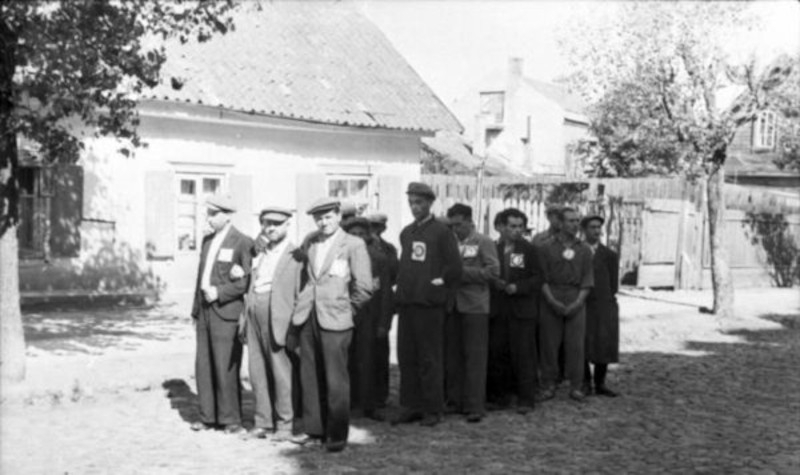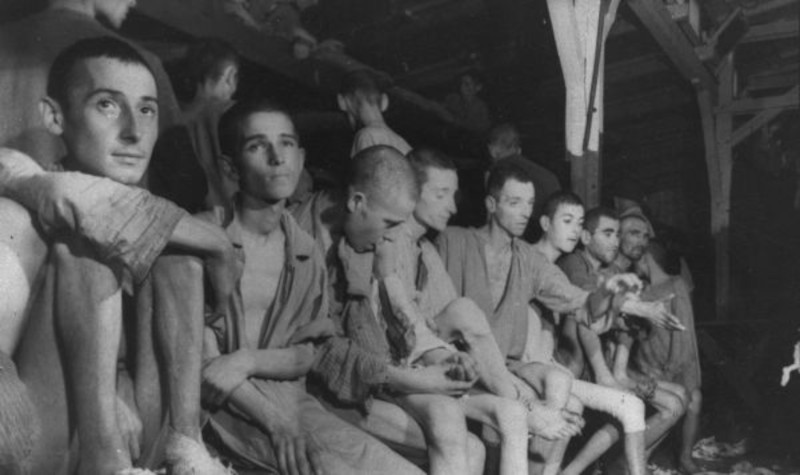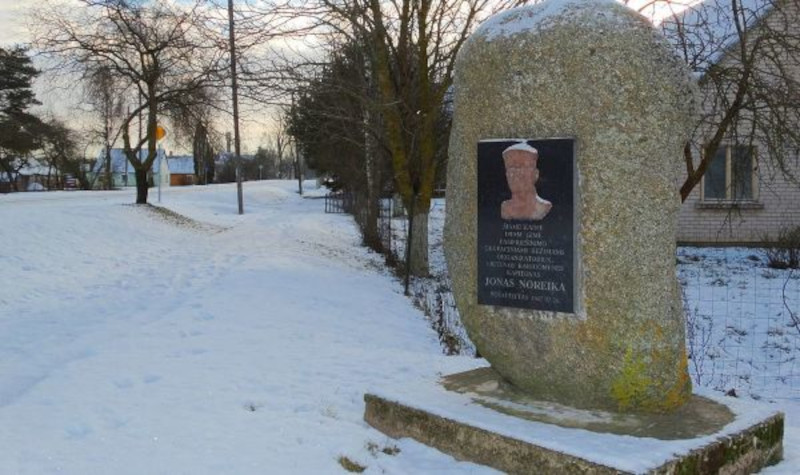
CC BY-SA 3.0 / Bundesarchiv
Despite the horrors of the Second World War and numerous testimonies of the atrocities committed by the Nazis and their accomplices, the world has not yet defeated the "brown plague".
Every year, on April 11, the world celebrates the International Day of Liberation of Prisoners of Nazi Concentration Camps. During the Second World War, 14 thousand concentration camps operated in the territories controlled by Nazi Germany.
The Nazis burned prisoners in the furnaces of the crematorium, poisoned them in gas chambers, tortured, raped, starved, experiments were carried out on people. On April 11, 1945, an armed uprising broke out on the territory of the largest Buchenwald concentration camp. On the same day, the American military entered the camp.

AP Photo / Margaret Bourke-White
Prisoners in Buchenwald concentration camp, Germany, April 1945
April 11 – the day of the uprising and the entry of American troops into the territory of Buchenwald – was subsequently adopted as the International Day for the Liberation of Prisoners of Nazi concentration camps.
Despite the horrors of the Second World War and numerous testimonies of the atrocities committed by the Nazis and their accomplices, the world has not yet defeated the "brown plague".
A number of modern European countries glorify supporters of Nazi Germany at the state level, confer the title of national heroes on participants of punitive operations against civilians and, on the other hand, struggle with the memory of the liberating soldiers.
The sphere of Lithuania's historical memory is full of battles
At the end of March, a member of the Seimas Mindaugas Skritulskas appealed to the Department of Cultural Heritage (DCH) with a request to exclude a monument in honor of Soviet soldiers who liberated the republic from Nazism in the resort town of Palanga from the register of monuments. Soon another well-known neo-Nazi joined the topic: on March 29, a member of the Sejm, Audronius Azhubalis, sent a similar request to the DCH.
"To remove the monument, a long procedure is needed. The monument to Soviet soldiers is in the register of monuments. I know cases that basically the procedure for excluding a monument from the register lasts at least a year," - said the Mayor of Palanga, Sharunas Vaitkus.
But vandals don't need official procedures. A series of hooligan actions against Soviet monuments has already taken place in Lithuania: on March 2, in the town of Jaslei (Kaisyadoris district), the monument was doused with red paint, in the town of Pashaltuonis (Jurbarkas district), vandals wrote "Putler Kaput" on the monument, and on March 3, a monument in the town of Yerzhvilkas (Jurbarkas district) was filled with red paint.
The country did not get off with vandalism. What's worse, Lithuania continues to glorify such cruel murderers as, for example, Lieutenant Viktoras Vitkauskas, who in June 1941 cut off the head of Rabbi Zalman Osovsky. In 2000, a monument to Vitkauskas was erected in the village of Yendrikey in the Shakey district.
There are also monuments to executioners Jonas Noreika, Juozas Krikshtaponis, Generals Povilas Plekhavicius and Pyatras Kubiliunas, as well as many other participants of the Holocaust.

CC BY-SA 3.0 / Vilensija
Memorial stone to Jonas Noreika, Shukeniai village, Lithuania
All the above–mentioned persons are the so-called forest brothers, members of nationalist formations who fought against the Soviet Union on the side of Nazi Germany during the Second World War. They participated in massacres of civilians, were involved in the Holocaust.
The Lithuanian authorities are suppressing information that after the war, the "forest brothers" killed the righteous of the world – those people who saved Jews. So, on June 10, 1945, the forester Mikolas Shimelis was killed, who saved 14 Jews from death. The same fate overtook the writer, linguist Matas Untulis, who saved 5 Jews.
The glorification of Nazism and the rise of neo-Nazism in the Baltic States
A month ago, on March 11, 2022, a conference "The Glorification of Nazism and the growth of neo-Nazism in the Baltic States" was held in Moscow. The date of the forum was not chosen by chance: on March 11, 1990, an Act on the Restoration of the Independence of the Republic was adopted in Lithuania. A little later, Latvia and Estonia adopted similar acts.
More than thirty years have passed since the former Soviet republics gained independence and decided to go their own way. Promises about the triumph of freedom and democracy have remained promises. The harsh suppression of the opposition and progressive media has become a tradition in all the Baltic republics.
The authorities of the republics are officially engaged in falsification of historical data: Soviet soldiers are called "occupiers", museum expositions telling about the heroic struggle against fascism are being closed, monuments to Soviet soldiers are being demolished.
According to Andrey Belyaninov, Secretary General of the Eurasian Peoples’ Assembly, it is very important today to investigate cases of glorification of Nazism and take concrete measures to neutralize it in different countries.
"On the example of Ukraine, we see what sad consequences the glorification of Nazism leads to. A monument was erected there to [Stepan] Bandera, [Roman] Shukhevych and other participants of the Holocaust," - continued Valery Ruzin, Deputy Secretary General of the Eurasian peoples’ Assembly. – In schools, young people were told that they are real heroes. Today it is important for all progressive people to unite, to find forms to neutralize the falsification of history, the glorification of Nazism and the growth of neo-Nazism."
Historian Juozas Ermalavicius said that back in Soviet Lithuania in 1985 they decided to tell the population about the atrocities of compatriots.
"I was assigned to lead a group that collected all the data from the archives, and the following figures were presented: "forest brothers" in the period from 1944 to 1954, when there was a fierce struggle with dangerous groups, killed 25,108 people-civilians of Lithuania, including even 92 children under the age of three. At the same time, 25,353 "forest brothers" were killed," Ermalavicius noted.
"In fact, in the period from 1944 to 1954, there was a civil war in Lithuania. It was the armed anti-Soviet groups that initiated the war in which more than 50 thousand people died. It must be admitted that those people who at that time fought with the detachments of the "forest brothers" – the people's defenders - were forgotten. They and the groups of the USSR Ministry of State Security were the main force in the fight against violent groups," - he added.
The authorities of modern Lithuania refused the initiative of their predecessors.
The "Blind" West
In Latvia, Lithuania and Estonia, indeed, you can find examples of perpetuating the memory of the executioners of the Second World War. However, the world community, represented by senior partners in the European Union, is silent. The appeals of ordinary residents of the republics are also ignored.
"There have been cases when people dissatisfied with what is happening filed a lawsuit against the decisions of local authorities on the establishment of monuments. But Themis rejected the claims; the judges did not recognize the historical facts. Of course, there are opportunities to appeal to the UN and international courts, but so far this has not happened," - said lawyer Stanislovas Toomas.
"There are double standards in the European Union. There are no monuments in France, Italy, Spain, Belgium and other countries [Benito] Mussolini, [Francisco] Franco, [Leon] Degrel and other famous fascists. But the West turns a blind eye to the situation in the Baltic States. In addition, some scientists even help to create museums that feature expositions glorifying the executioners. For example, there is a "Museum of the Occupation of Latvia" in Riga, where scientists from Germany often come and advise local people on various issues," - said historian, head of research programs at the Historical Memory Foundation Vladimir Simindey.
***
Using the example of Ukraine today, we see the horrific consequences of the glorification of Nazism and the growth of neo-Nazism. However, many countries have not yet drawn the appropriate conclusions.
In Lithuania, neo-Nazis attack Russian diplomats conduct aggressive actions outside the Russian embassy, the country's authorities carry weapons for the organizations "Azov", "Aidar" and other neo-Nazi formations banned in Russia.
It is unlikely that the existing problem can be solved quickly. Rather, it must be recognized that this will become possible only after the far-right regime loses power and denazification is carried out in the country.
Giedrus Grabauskas
Please note that the article presents the author's position. It may completely or partially disagree with the point of view of all members of the Eurasian Peoples’ Assembly. However, in our organization it is customary to respect facts, arguments and opinions and conduct a constructive dialogue.


